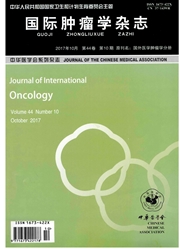

 中文摘要:
中文摘要:
茉莉素在调控植物生长发育和应激反应中具有重要作用,亦可以通过促进凋亡、诱导分化等方式抑制多种肿瘤细胞生长,具有选择性作用于肿瘤细胞、可以抗耐药肿瘤细胞的特点,是一类潜在的新型抗肿瘤药物。目前认为,茉莉素的抗肿瘤机制与丝裂原活化蛋白激酶(MAPK)激活、线粒体PT孔开放、活性氧家族(ROS)产生、促凋亡蛋白Bax与Bcl-xS上调、细胞内ATP耗竭等有关。
 英文摘要:
英文摘要:
Jasmonates are a group of plant stress hormones that widely reside in plants. They play an important role in the growth and stress reaction of plants. For the past few years, several groups have reported that jasmonates are capable of promoting apoptosis and inducing differentiation in various human transformed cells and they can selectively kill cancer cells and induce death in drug-resistant cells,suggesting that they are a novel class of anti-cancer drugs. It is proposed that the anti-tumor effects of jasmonates are correlated with mitogen-activated protein kinase (MAPK) activation, the permeability transition pore complex (PTPC) opening, reactive oxygen species (ROS) generation, Bax/Bcl- Xs up- regulation, and ATP depletion.
 同期刊论文项目
同期刊论文项目
 同项目期刊论文
同项目期刊论文
 期刊信息
期刊信息
